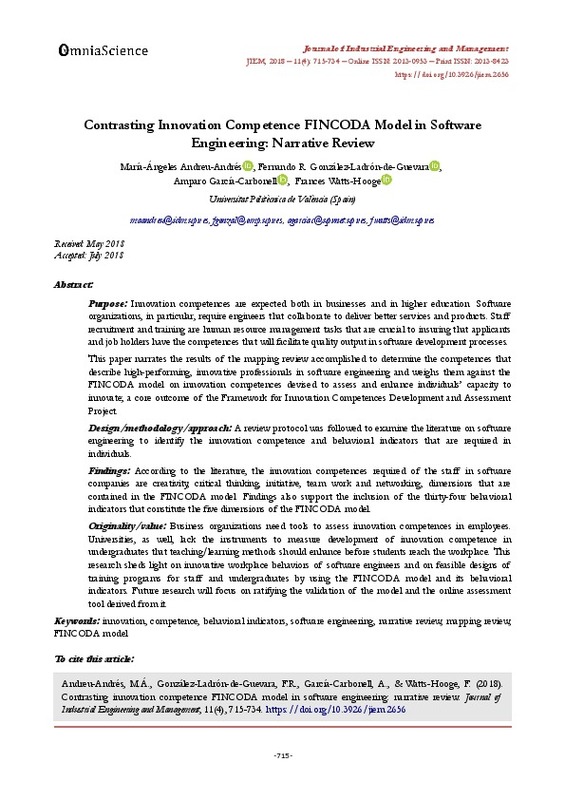JavaScript is disabled for your browser. Some features of this site may not work without it.
Buscar en RiuNet
Listar
Mi cuenta
Estadísticas
Ayuda RiuNet
Admin. UPV
Contrasting Innovation Competence FINCODA Model in Software Engineering: Narrative Review
Mostrar el registro completo del ítem
Andreu Andrés, MA.; González-Ladrón-De-Guevara, F.; García Carbonell, A.; Watts Hooge, FI. (2018). Contrasting Innovation Competence FINCODA Model in Software Engineering: Narrative Review. Journal of Industrial Engineering and Management. 11(4):715-734. https://doi.org/10.3926/jiem.2656
Por favor, use este identificador para citar o enlazar este ítem: http://hdl.handle.net/10251/147623
Ficheros en el ítem
Metadatos del ítem
| Título: | Contrasting Innovation Competence FINCODA Model in Software Engineering: Narrative Review | |
| Autor: | García Carbonell, Amparo Watts Hooge, Frances Irene | |
| Entidad UPV: |
|
|
| Fecha difusión: |
|
|
| Resumen: |
[EN] Purpose: Innovation competences are expected both in businesses and in higher education. Software organizations, in particular, require engineers that collaborate to deliver better services and products. Staff recruitment ...[+]
|
|
| Palabras clave: |
|
|
| Derechos de uso: | Reconocimiento - No comercial (by-nc) | |
| Fuente: |
|
|
| DOI: |
|
|
| Editorial: |
|
|
| Versión del editor: | https://doi.org/10.3926/jiem.2656 | |
| Código del Proyecto: |
|
|
| Agradecimientos: |
This work has been conducted as part of a European project financed by the European Union ["FINCODA" Project 554493-EPP-1-2014-1-FI-EPPKA2-KA] (http://bit.ly/FINCODA-EUsite01). (The European Commission support for the ...[+]
|
|
| Tipo: |
|









